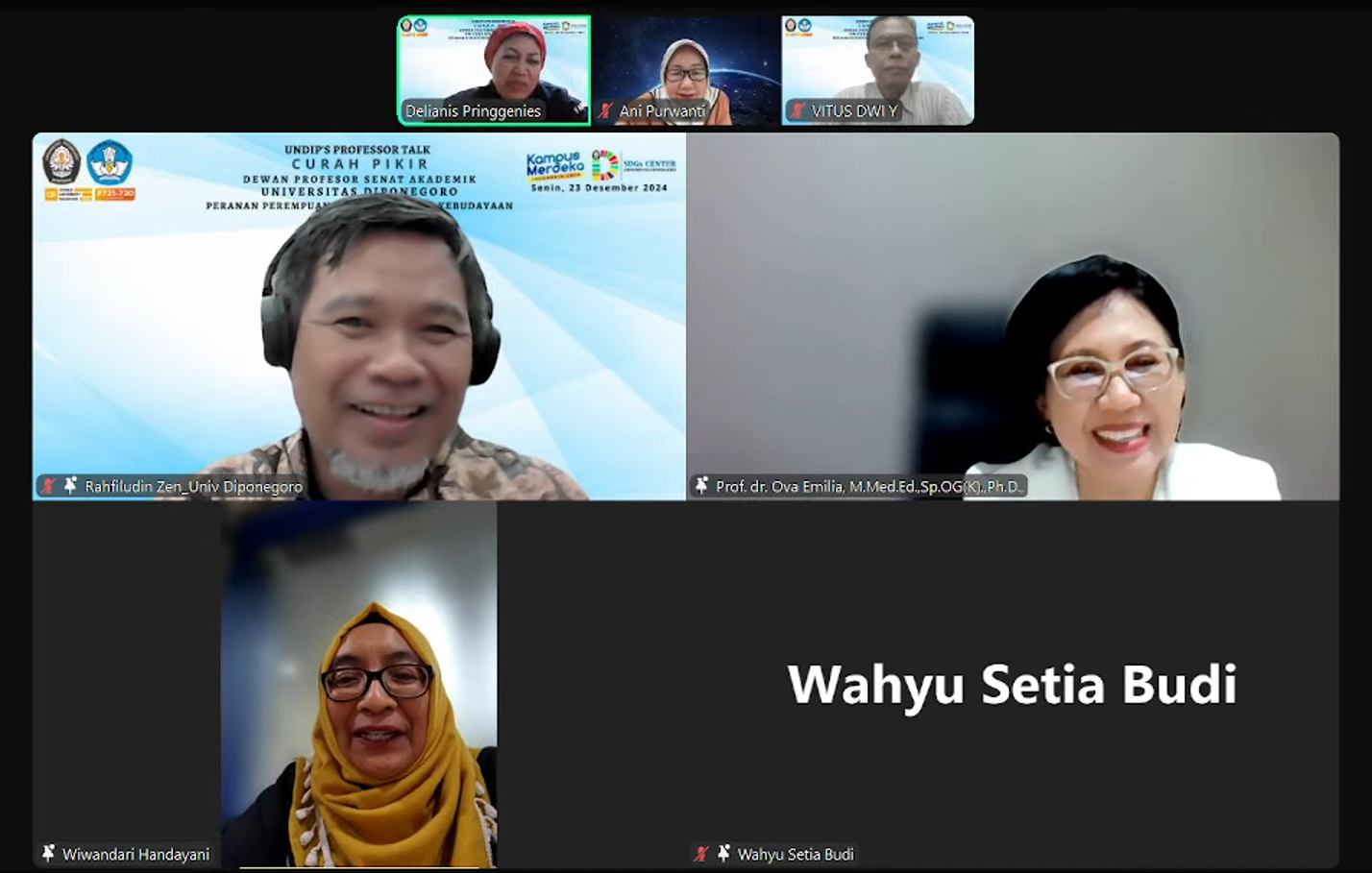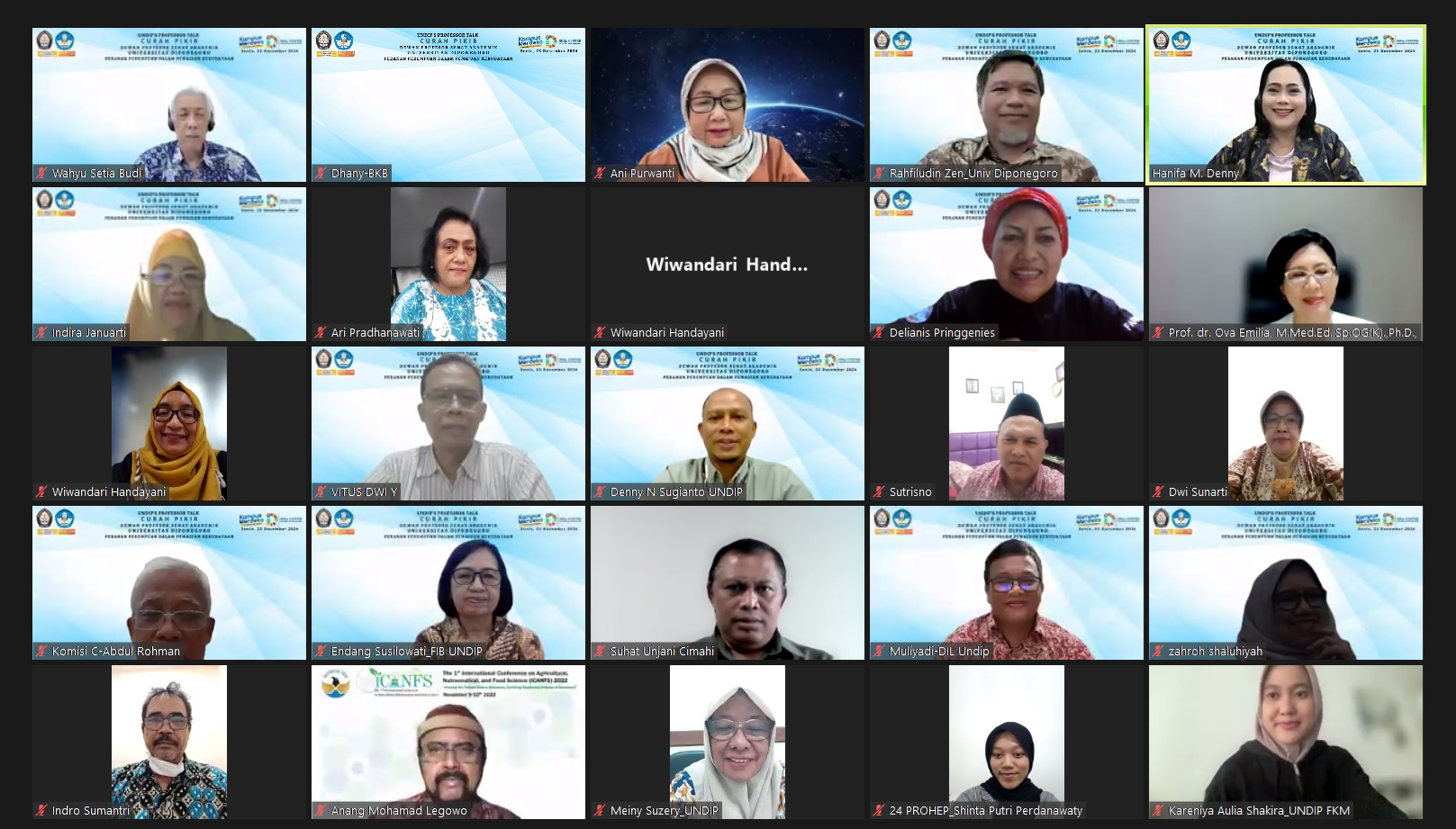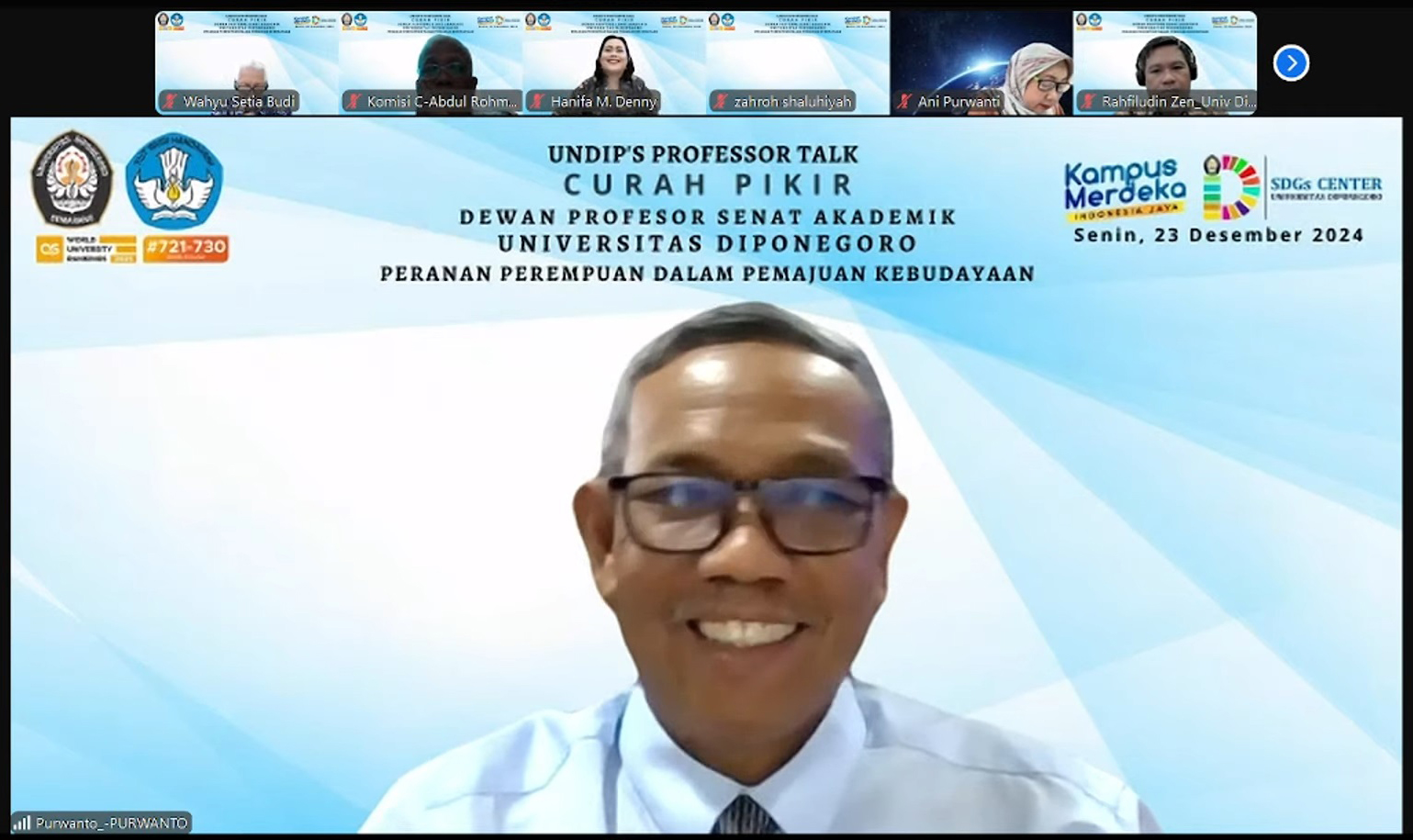The Academic Senate’s Board of Professors at Universitas Diponegoro (UNDIP) held a webinar titled “UNDIP’s Professor Talk” on Monday, December 23, 2024, at 1:00 PM. The event, hosted online via Zoom meeting and streamed live on UNDIPTV’s official YouTube channel, explored the theme “The Role of Women in Advancing Culture.”
The Chair of the Board of Professors, Prof. Dr. Ir. Purwanto, DEA, officially opened the event. In his opening remarks, Prof. Purwanto explained that the webinar’s topic was chosen to commemorate Mother’s Day, celebrated on December 22. “This is an important moment to recognize and appreciate women’s roles and contributions across various aspects of life, including in advancing and preserving culture, such as maintaining traditions at home and within communities, preserving oral traditions, and safeguarding local languages that women continue to pass down to their children,” he said.
Prof. Purwanto also emphasized women’s significant contributions to the economy, especially in supporting small and medium enterprises (SMEs), such as batik production and handicrafts spread across Indonesia. “Women create innovative works that support industries and small businesses,” he added.
Additionally, Prof. Purwanto highlighted women’s roles in environmental conservation. The 10 Program Pokok PKK (Family Welfare Movement Primary Program) includes environmental preservation, aligning with Indonesia’s commitment to achieving Net Zero Emissions by 2060. Women also play a crucial role in education, as evidenced by the number of women serving as teachers and lecturers and holding strategic positions in various institutions.
“The knowledge and insights shared in this discussion will hopefully benefit us all and inspire women to take more active roles in contributing to the advancement of the nation and their families,” said Prof. Purwanto.
Meanwhile, the Chair of Commission C, Prof. Dr. Abdul Rohman, S.E., M.Si., explained that the webinar was designed to discuss women’s central role as cultural agents. It explored how women contribute significantly to creating, maintaining, and preserving local culture, as well as how they act as key mediators in transferring cultural knowledge, including customs, languages, music, dances, and folklore.
Moderated by Prof. Dr. Mohammad Zen Rahfiludin, S.KM., M.Kes., the webinar featured three speakers. They are Prof. Dr. Drs. Wahyu Setia Budi, M.S., F.Med., Professor from the Faculty of Science and Mathematics UNDIP; Prof. Dr.Ing. Wiwandari Handayani, S.T., M.T., MPS., Professor from the Faculty of Engineering UNDIP, and Prof. dr. Ova Emilia, M.Med.Ed., Sp.OG(K)., Ph.D., Rector of Universitas Gadjah Mada (UGM).
In the first session, Prof. Wahyu Setia Budi presented “Women in Radiation Safety Culture and Utilization.” He emphasized the importance of adhering to safety regulations. “We must comply with the rules by taking steps to reduce risks and prevent sanctions; this will increase the reputation of the institution. Then, we must protect the health of workers and the environment from the negative impacts of radiation and environmental health protection; this will increase the reputation of public trust. And we must form a culture of supervision so that all equipment functions properly and maintains the sustainability of operations in institutions that utilize radiation technology,” said Prof. Wahyu Setia Budi.
Radiation safety culture is not only the responsibility of the institution but also involves various parties, such as health workers/radiation workers (Doctors, Medical Physicists, Radiographers), male/female patients, patient companions, and the community. Through the participation of all parties, the radiation safety culture can be improved, and the risk of radiation exposure can be minimized without reducing the benefits of this technology.
In the second session, Prof. Wiwandari Handayani discussed “Women as Agents of Innovation and Cultural Education.” She noted that optimizing women’s role in advancing culture and innovation faces challenges, including capacity gaps and persistent perceptions of women’s inequality in decision-making. However, some obstacles need to be faced, such as the lack of women’s capacity and the continued perception that women are not equal to men in decision-making both within the family and in society.
“This results in families not yet becoming the driving force for development and environmental management,” she said.
The final speaker, Prof. Ova Emilia, addressed “The Role of Women in Advancing Culture: A Multidimensional Perspective.” She underscored education as the foundational step to improving women’s quality of life.
Institutions should create safe, conducive, and inclusive learning environments, including infrastructure, competence, and a service system supported by a ‘healthy promoting university.’ “To build a civilized and cultured nation, start by improving women’s well-being—physically, mentally, and socially,” she emphasized.
The webinar concluded with a discussion session where participants posed questions about women’s roles in cultural advancement. The session highlighted that women are essential agents of innovation and change in environmental management, cultural preservation, and participation in artistic traditions. The government was urged to enhance efforts to improve women’s quality of life. (Dhany/Marta/Wulan-PR)












